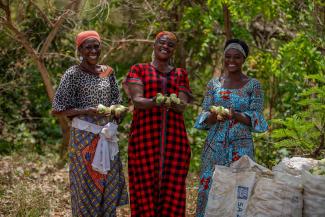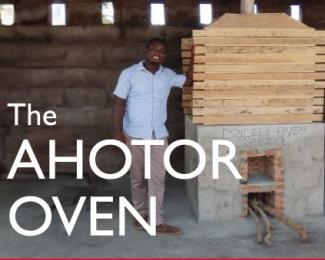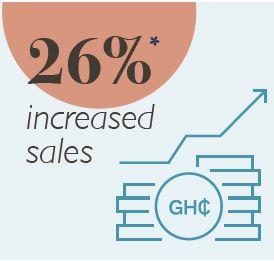
Yooku Ata-Bedu
OVERVIEW
Ghana’s economy is expected to grow by 3.1% in 2024, though the rate of people living in poverty did increase in 2023 to about 31 out of every 100 people. The projected positive outlook is because of improvements in public financial management, and reduced price inflation. USAID/Ghana’s Food
Security Strategy supports this growth by focusing on agriculture for improved food security, sustainable growth and better nutrition.
Even though things are looking up, prices of goods and services are still high, and the reduced value of the Ghana Cedi, shortages of fuel and fertilizer and frequent power outages remain a challenge. COVID-19 and the Russia-Ukraine war, which has increased the prices of fertilizers and farm inputs,
are also negatively affecting the economy. USAID is working with partners to help Ghana’s economy grow.
PROGRAMMATIC FOCUS
● Promoting agriculture-led economic growth.
● Accelerating access to clean water and sanitation for households and institutions.
● Partnering with the private sector to promote macroeconomic stability and job creation.
● Improving energy sector performance.
● Supporting Ghana to achieve economic growth milestones and receive $360million as the next tranche of the International Monetary Fund Extended Credit Facility program.
ACHIEVEMENTS TO DATE
AGRICULTURE
- The Farmer Support Activity (FSA) expanded funding from $7million to $17million and is helping over 35,000 targeted smallholder farmers to buy farm inputs, including fertilizers, and to build their resilience against the economic shocks through a cash transfer program. FSA also trained farmers, including women and people with disabilities, and workers from the Ministry of Food and Agriculture Extensions Services, on good agronomic practices, business management, digital and financial literacy, and improved nutrition.
- The Market System and Resilience Activity (MSR) has generated sales worth $2million, and provided business development services to professionalize and commercialize the operations of 198 local agribusinesses. This support has enabled the agribusinesses to provide inputs and production services to over 125,000 smallholder farmers. Additionally, MSR launched a Youth Internship Program, placing 100 students in agribusinesses for practical experience before entering the workforce. In 2023, MSR trained 187 out-grower businesses and seven business network associations in gender equality and positive youth development, increasing women's and youth participation in agricultural markets. The MSR Activity boosted agriculture-led economic growth in northern Ghana by promoting gender, youth, and disability inclusion in production and market systems.
- The Alliance for Green Revolution in Africa (AGRA) wrapped up its successful “Grow Ghana” partnership with private sector fertilizer company Yara Ghana. Under the Partnership for Inclusive Agricultural Transformation in Africa. In 2023, USAID investments resulted in 287 last-mile agro-dealers gaining access to 27,131 metric tons of fertilizer, worth $25.5million, to cultivate 200,000 metric tons of cereal on more than 140,000 hectares, ultimately feeding over a million people.
- The Ghana Fisheries Recovery Activity (GFRA) supported the Ministry and Fisheries and Aquaculture, and the Fisheries Commission in implementing various management measures aimed at restoring Ghana's fish stocks. These initiatives include the closed fishing season, the introduction of the Electronic Monitoring System for industrial vessels, and the establishment of regional co-management committees and local landing beach enforcement committees to ensure the participation of fishers in management decisions and actions that affect their lives and livelihoods. GFRA also trained 1,355 youth from coastal communities on electrical installation and repairs, plumbing, garment making, catering and more, to improve their income earning options due to dwindling fish stocks. As part of efforts to reduce the prevalence of unintended pregnancies in fishing communities, GFRA collaborated with the Total Family Health Organization to educate over 5,500 people on sexual and reproductive health and provide family planning services to over 3,000 individuals.
TRADE/FINANCE
- Under the Ghana Trade and Investment (GTI) Activity, USAID worked with the Customs Division of the Ghana Revenue Authority to conduct a Time Release Study (TRS), Ghana’s first-ever study to assess customs clearance processes and the actual time taken from the arrival of cargo to its release to its owners at four major locations. The TRS was - a long-standing but previously unmet World Trade Organization requirement. Currently, GTI is helping to implement several of the recommendations through multi-prong initiatives related to compliance, document digitization and consolidation, and information sharing at trade hubs and police checkpoints. GTI also supported 74 small and medium enterprises to access new markets by participating in international trade shows. This has generated approximately $20 million in sales.
- Under the Mobilizing Finance in Agriculture (MFA) Activity, USAID technical assistance including training, certification, support for business plan development, and direct co-investment of firms and farms facilitated and unlocked over $272 million worth of agricultural financing. In February 2024, MFA hosted USAID Ghana’s first Climate Finance Conference, which secured participation from nearly 400 stakeholders. The conference yielded potential deals totaling over $7 million, currently in various stages of processing with selected institutions.
- The West Africa Trade and Investment Hub supported the completion of state-of-the-art processing facilities for shea butter, traditional black soap, and the ancient grain fonio. These partnerships have created about 20,000 jobs and almost $100 million in exports.
ENERGY
- The West Africa Energy Program supported the Ministry of Energy to develop and use an Inventory Management System (IMS) to streamline the electrification process and accelerate the implementation of the rural electrification program. The program achieved over 400,000 electrification connections through the use of the IMS over the five year implementation period.
WATER SANITATION AND HYGIENE (WASH)
- The Enhancing WASH Activity provided 32,996 people with access to basic water and 35,020 people access to sanitation services from October 2023 to March 2024 in northern Ghana and Oti Region. In addition, two healthcare facilities and six schools were provided with mechanized water systems during the same period.
ENABLING ENVIRONMENT
- The Policy LINK Activity (PLA) collaborated with the Ministry of Food and Agriculture Directorate of Crop Services to coordinate three subnational consultations based on the revision of the Climate-Smart Agriculture and Food Security Action Plan, which expired in 2020. A total of 203 participants (157 men and 36 women) participated in the consultative workshops. The revision is expected to be completed in quarter three of 2024. PLA and the National Insurance Commission also worked together to operationalize the Agriculture Insurance Fund (AIF) and Agriculture Insurance Policy in Ghana. PLA is currently recruiting a consulting firm to design the AIF.
OBJECTIVES IN 2024
- Generate approximately $310million in agricultural sales for farmers and businesses.
- Provide access to sustainable and climate-resilient water supply for 95,000 people and sanitation services for 154,293 people, improve the performance of water and sanitation service providers, and strengthen the capacity of national and sub-national institutions.
- Optimize utility performance to increase energy access.


